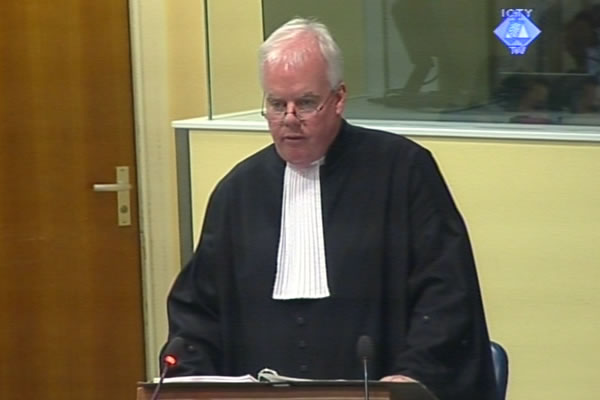Home
PROSECUTION: MLADIC’S DIARIES ARE EVIDENCE AGAINST MLADIC
The prosecution has filed a motion to tender into evidence 22 notebooks Ratko Mladic used to write his notes during the war, from 1991 to 1996. As the prosecution contends, the notebooks could be very useful in proving the responsibility of the former Bosnian Serb army commander
 Dermot Groome, prosecutor at the Ratko Mladic trial
Dermot Groome, prosecutor at the Ratko Mladic trial Though the beginning of the prosecution’s case has been suspended ‘until further notice’ because of its failure to disclose evidence to the defense on time, today the prosecution submitted a motion to Judge Orie’s Trial Chamber to tender into evidence all of Ratko Mladic’s war diaries, contained in 22 notebooks. From 1991 to 1996, Mladic wrote in his impressions from various meetings, first as a JNA officer and then as the commander of the VRS Main Staff.
The motion recalls that the Serbian authorities seized the notebooks in two searches of Mladic’s apartment in 2008 and 2010. At other trials, parts of the notebooks were admitted into evidence as prosecution exhibits because they were deemed relevant for those cases. The judges at those trials decided that the diaries were ‘relevant, reliable and have evidentiary value’. Highlighting the evidence on the authenticity of the diaries, the prosecution recalled that Mladic’s key associate in the VRS Main Staff Manojlo Milovanovic confirmed before the Tribunal that the handwriting was that of the accused. When the prosecution tendered parts of the notebooks into evidence at Vojislav Seselj’s trial, the judges called a handwriting expert who confirmed that the diaries were authentic. Finally, as the prosecution recalled, Mladic himself has recently confirmed in court that the notes were his.
Apart from their unquestionable authenticity, the prosecution argues that admitting the diaries into evidence from the bar table could save court time and streamline the prosecution’s case. Explaining why it was tendering the diaries into evidence in their entirety, the prosecution noted that 20 diaries contained evidence about the actions, behavior and state of mind of the accused in the period relevant for the indictment, which charges Mladic with genocide and other crimes in BH. The two remaining notebooks show Mladic’s intentions during the armed conflict.
In their entirety, the diaries paint a picture of the effort to ‘plan and implement the joint criminal enterprises alleged in the indictment’, the prosecution contends. The motion notes that the entries show that even before Mladic’s involvement in the crimes in BH, he took part in the ethnic cleansing of parts of Croatia while he served as the commander of the JNA Knin Corps. The notebooks also show that the accused took part in the preparations for the crimes by providing arms and training to the units subordinated to the people who were also part of the joint criminal enterprises. The prosecution argues that the diaries show the accused was ‘kept informed from early on’ about the purpose and nature of the planned campaign of crimes, including the separation of the Serb territories from the territories which were to be inhabited by the two other ethnic communities in BH. This goal was implemented by ethnic cleansing.
In the prosecution’s view, the diaries show there was ‘communication and cooperation’ of various members of joint criminal enterprises and lay bare the crimes, either listed in the indictment or not alleged therein.
Ratko Mladic is charged with taking part in four joint criminal enterprises. The first was ethnic cleansing aimed at the forcible and permanent elimination of Bosnian Muslims and Croats from large parts of BH in 1992, which reached the scale of genocide in some municipalities. The remaining three joint criminal enterprises are the artillery and sniper terror campaign in Sarajevo, taking UN staff hostage in May and June 1995 and the genocide in Srebrenica in July 1995.Linked Reports
- Case : Mladic
- 2012-06-18 RATKO MLADIC TRIAL SUSPENDED ‘UNTIL FURTHER NOTICE’
- 2012-05-31 MLADIC’S NEW MOTION TO ADJOURN TRIAL
- 2012-05-24 RATKO MLADIC’S TRIAL CONTINUES ON 25 JUNE 2012
- 2012-06-26 SEVEN WITNESSES IN THE FIRST SEGMENT OF RATKO MLADIC’S TRIAL
- 2012-07-02 MLADIC’S DEFENSE WANTS THREE WITNESSES TO TESTIFY LATER THAN PLANNED
- 2012-07-05 MLADIC’S MOTION TO POSTPONE EVIDENCE OF THREE WITNESSES DISMISSED
